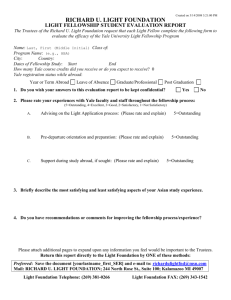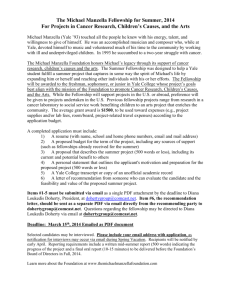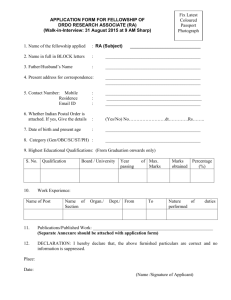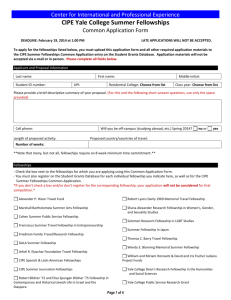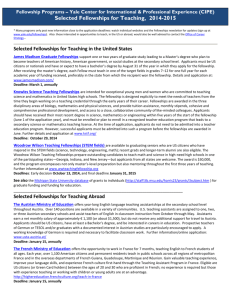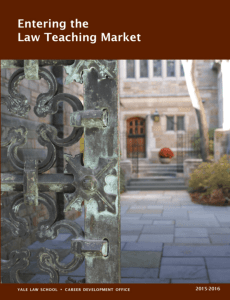Writing a Fellowship Proposal
advertisement
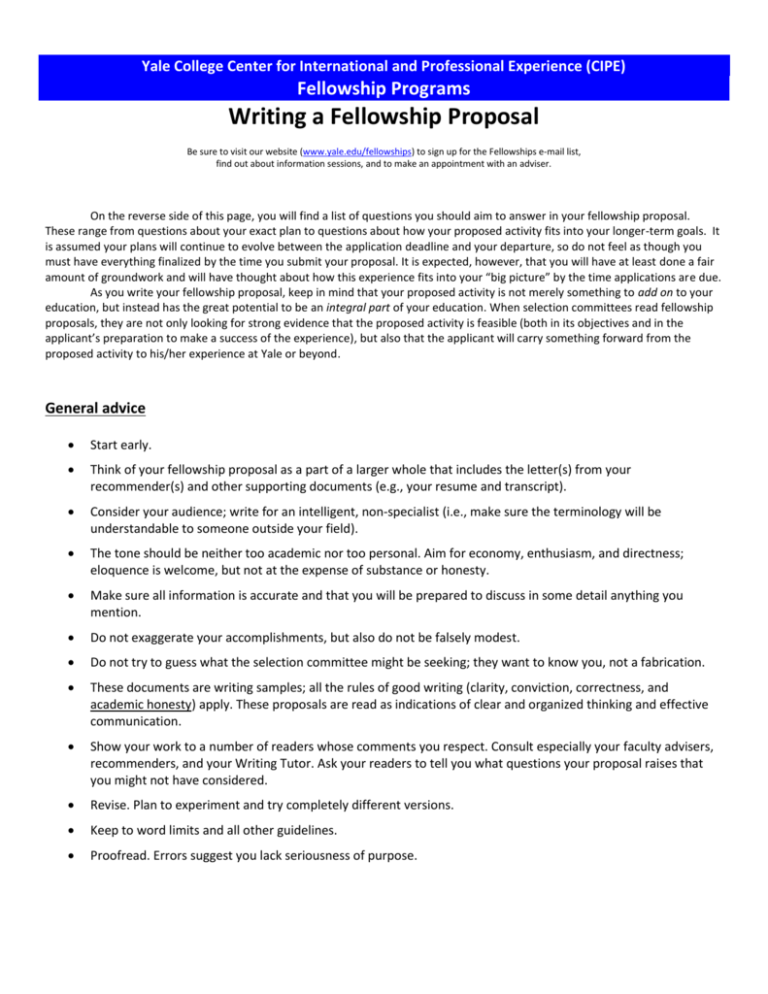
Yale College Center for International and Professional Experience (CIPE) Fellowship Programs Writing a Fellowship Proposal Be sure to visit our website (www.yale.edu/fellowships) to sign up for the Fellowships e-mail list, find out about information sessions, and to make an appointment with an adviser. On the reverse side of this page, you will find a list of questions you should aim to answer in your fellowship proposal. These range from questions about your exact plan to questions about how your proposed activity fits into your longer-term goals. It is assumed your plans will continue to evolve between the application deadline and your departure, so do not feel as though you must have everything finalized by the time you submit your proposal. It is expected, however, that you will have at least done a fair amount of groundwork and will have thought about how this experience fits into your “big picture” by the time applications are due. As you write your fellowship proposal, keep in mind that your proposed activity is not merely something to add on to your education, but instead has the great potential to be an integral part of your education. When selection committees read fellowship proposals, they are not only looking for strong evidence that the proposed activity is feasible (both in its objectives and in the applicant’s preparation to make a success of the experience), but also that the applicant will carry something forward from the proposed activity to his/her experience at Yale or beyond. General advice Start early. Think of your fellowship proposal as a part of a larger whole that includes the letter(s) from your recommender(s) and other supporting documents (e.g., your resume and transcript). Consider your audience; write for an intelligent, non-specialist (i.e., make sure the terminology will be understandable to someone outside your field). The tone should be neither too academic nor too personal. Aim for economy, enthusiasm, and directness; eloquence is welcome, but not at the expense of substance or honesty. Make sure all information is accurate and that you will be prepared to discuss in some detail anything you mention. Do not exaggerate your accomplishments, but also do not be falsely modest. Do not try to guess what the selection committee might be seeking; they want to know you, not a fabrication. These documents are writing samples; all the rules of good writing (clarity, conviction, correctness, and academic honesty) apply. These proposals are read as indications of clear and organized thinking and effective communication. Show your work to a number of readers whose comments you respect. Consult especially your faculty advisers, recommenders, and your Writing Tutor. Ask your readers to tell you what questions your proposal raises that you might not have considered. Revise. Plan to experiment and try completely different versions. Keep to word limits and all other guidelines. Proofread. Errors suggest you lack seriousness of purpose. To get your pen/keyboard going… Use this as a worksheet. If you can respond to these items clearly and thoroughly, you are in a great position to write your fellowship proposal. From where did your motivation/inspiration for your proposed idea arise? Why is this project important to you? With whom have you developed your proposed idea? (Please note that any research projects should be discussed with a faculty mentor, and this person will be expected to write your letter of recommendation.) Where are you proposing to go, and why is it important that you conduct your project there instead of elsewhere? If appropriate, describe your knowledge of the local language and/or the culture of the country to which you are proposing to go. What contacts have you made (or do you plan to make) in your proposed destination? What other coursework and job/research/extracurricular experience has prepared you to make a success out of your proposed activity? In other words, how are you qualified to carry out your project? If conducting research, what theoretical framework will you employ and what methodology will you use? If planning interviews, is this acceptable in your proposed destination and how will you devise a valid interview instrument? (If conducting interviews, or if your project involves human subjects in any other way, you must find out if you need IRB approval. If so, you must obtain this approval before you can receive your fellowship check, and you should start this process before you submit your fellowship application. Visit http://www.yale.edu/hrpp/forms-templates/behavioral.html and click on “student projects” for more information.) If participating in an internship, how will you be contributing to your chosen organization? (The committees understand that you might not have all the details or even confirmation that you’ve secured the internship, but you should provide them with as much information as possible.) Provide a reasonable timeline and general explanation of how you will successfully carry out your project in the proposed timeframe. What do you hope to accomplish as you carry out your project? What are your longer-term academic and/or professional goals, and how might these benefit from your proposed experience? (In addition to developing specific skills or learning more about a specific topic, you may consider how this experience might inform your choice of classes or major and how this experience might shape your career path or other future aspirations.) What challenges or difficulties do you anticipate to encounter, and how might you overcome these? What aspects of your proposed project and/or preparation still need to develop, and how do you plan to address these before/while carrying out your project? Yale College Center for International and Professional Experience Fellowship Programs 55 Whitney Avenue, 3rd floor fellowships@yale.edu www.yale.edu/fellowships tel. 203-432-8685
